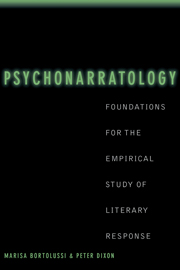Book contents
8 - Directions and Unsolved Problems
Published online by Cambridge University Press: 28 July 2009
Summary
The title of this chapter is perhaps presumptuous because it suggests that some problems have been solved. In fact, even for issues we dealt with in some depth, such as narratorial implicatures and narrator–character associations, the present work merely scratches the surface. Thus, it is perhaps more appropriate to regard this work as an outline of an approach or framework, and the presented research provides only an illustration of the kind of work that can be done within that framework. Further, although we have attempted to cover a broad class of issues in the processing of narrative, there are many areas on which we have not touched. In this chapter, we discuss how psychonarratology could be developed to deal with some of these. First, we recapitulate what we see as the essential ingredients in our approach and summarize some of the specific ideas we have applied to the classic issues in narratology and literary studies. Following that, we discuss some important complications that we have glossed over in our treatment of these issues. Then, we describe some of the other obvious areas in which our treatment has yet to be applied but for which it seems ideally suited. Finally, we mention a few allied domains for which psychonarratology may have implications.
The Psychonarratology Approach
Core Assumptions
Psychonarratology is an interdisciplinary approach to the study of the processing of narrative form.
- Type
- Chapter
- Information
- PsychonarratologyFoundations for the Empirical Study of Literary Response, pp. 237 - 260Publisher: Cambridge University PressPrint publication year: 2002



